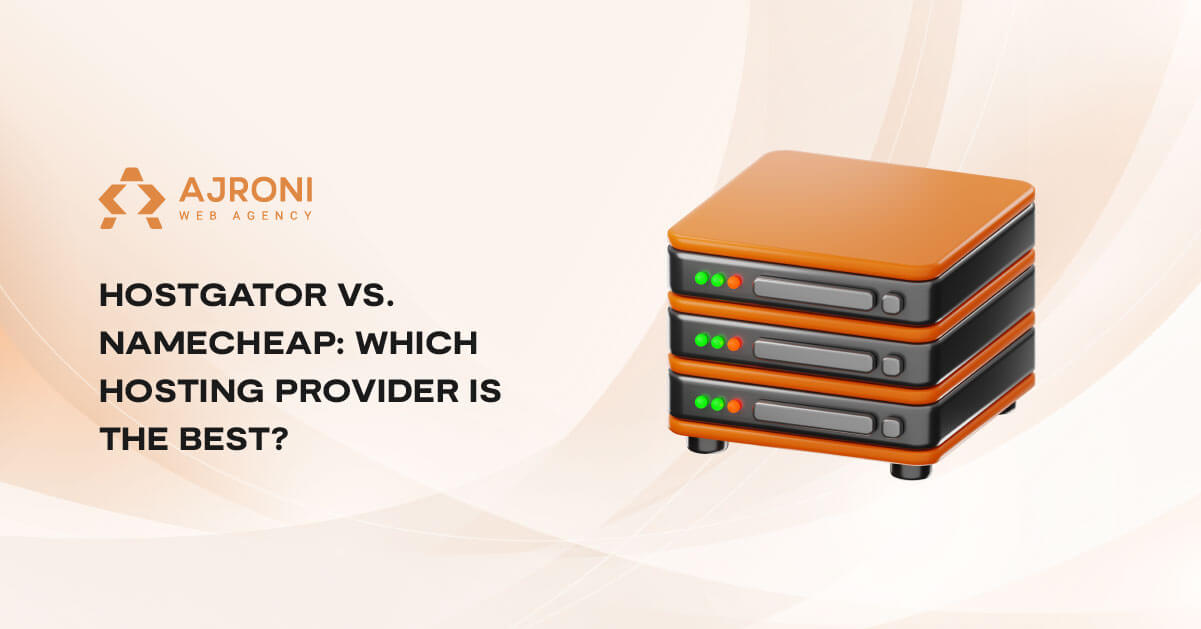Do you need help finding a good hosting company for your website? If you're building it from scratch, you most likely know the importance of choosing the right hosting company and finding a domain name. These are the two basic steps to start with.
HostGator vs. Namecheap Comparison
Yes, there are many available alternatives out there, so choosing one hosting provider out of thousands of them can be challenging and even tricky. It also depends on your goals and how much you plan on spending.To help you create a general idea, today, we will compare two of the most popular hosting companies you've probably heard of, HostGator and Namecheap.
Namecheap and HostGator are both well-known names in their industry. Their main differences are in parameters such as plans and prices, support, key features, security, uptime, and performance.
So, if you're planning on building an online presence, this comparison should give you an idea and help you decide which company to choose. Let's get started!
Why Do You Need to Host Your Website?
When you create a website, you are making a collection of files that need to be stored somewhere so that others can see them. This is where hosting comes in.Hosting refers to storing your website's files on a server, a computer specifically designed to host websites and make them accessible to visitors. When someone types in your website's address (also known as the URL) into their web browser, the browser sends a request to the server where your website is hosted. The server then responds by delivering the website's files to the user's browser, which displays the website on the user's computer or device.
The summarized advantages of hosting are:
- 1. To make your website accessible: For others to access and view your website, it needs to be hosted on a connected server. Your website will be accessible when users type your URL into their web browser.
- 2. To build a professional online presence: Hosting your website can help you select a professional online presence and credibility. Your domain name and website make your business or personal brand more memorable and trustworthy to potential customers or clients.
- 3. To control and customize your website: When you host your own website, you have complete control over how it looks and functions. This allows you to customize your website to meet your specific needs and goals.
- 4. To track and analyze your website's performance: Hosting your own website also allows you to track and analyze the performance of your website using tools like Google Analytics. This can help you understand how users interact with your website and identify opportunities for improvement.
- 5. To create a platform for online marketing and e-commerce: If you are running a business or selling products or services online, hosting your own website can provide you with a platform to market your products and services and facilitate e-commerce transactions.
About Namecheap

Founded in 2000, Namecheap is one of the market leaders in the field of domain registrars, with highly reliable web hosting services. Unlike other web host interfaces, this one is keen and organized, with all options well-structured in the sidebar. And if you need to learn how to use it, you can find beginner-friendly videos that walk you through managing tasks in the backend.
Namecheap, as its name suggests, is widely known for offering low-cost domain registration and additional services such as SSL certificates, website builder tools, and email hosting. Small businesses and individuals who want to establish an online presence highly value Namecheap's privacy and security commitment.
So, not only can you enjoy all the benefits with the package, but you can take advantage of it for inexpensive prices. Also, a 30-day money-back guarantee is included, so you can test it out and decide if you want to purchase the plan.
About HostGator

HostGator was founded in 2022 and belongs to the EIG group of hosting services. This great hosting company has precisely what you need if you're on a budget.
Among the services offered by HostGator, we can certainly say domain registration, website design, and development services are some of the best ones. The company provides different hosting services, including shared hosting, VPS (Virtual Private Server), and dedicated server hosting.
Designed to suit businesses' and individuals' goals, the hosting plans are cost-effective solutions for those who are just starting and only need a few resources. HostGator also provides e-commerce solutions, including shopping cart software and SSL certificates, to help businesses build and manage online stores.
HostGator guarantees you at least 99.9% uptime and 45 full days to request a refund if needed.
Namecheap vs. Hostgator: SSL certificates
SSL (Secure Sockets Layer) certificates are significant to secure communication between a website and its visitors. An SSL certificate protects sensitive information, such as login credentials and credit card numbers, from being intercepted by third parties.Here is a comparison of the SSL certificates offered by Namecheap and HostGator:
Namecheap:
- Namecheap offers domain validation (DV), organization validation (OV), and extended validation (EV) certificates.
- Prices start at $9.88 per year for a DV certificate and go up to $179.88 per year for an EV certificate.
- Namecheap's SSL certificates come with various features, including unlimited server licenses, free site seals, and unlimited reissues.
HostGator:
- HostGator offers DV, OV, and EV certificates.
- Prices start at $49.95 per year for a DV certificate and go up to $249.95 per year for an EV certificate.
- HostGator's SSL certificates also come with the same features as Namecheap.
Since both Namecheap and HostGator offer a variety of SSL certificates with similar features and benefits, your website will be secured either way. However, the main difference is that Namecheap's SSL certificates are slightly cheaper than HostGator's. Before deciding which is better for you, review the type of certificate and the term length in advance.
Namecheap vs. Hostgator: Disk Space
A significant factor to consider before choosing a hosting company is disk space. It is essential, as it determines the amount of data you can store on your website. Here is a comparison of the disk space offered by Namecheap and HostGator:Namecheap:
- Namecheap offers shared hosting plans, with disk space ranging from 20 GB to unlimited.
- Prices start at $1.44 per month for the Stellar plan, and this one includes 20 GB of disk space.
- Namecheap's shared hosting plans also include unlimited bandwidth and unlimited email accounts.
HostGator:
- HostGator offers shared hosting plans, with disk space ranging from 100 GB to unlimited.
- Prices start at $2.75 per month for the Hatchling plan, which includes 100 GB of disk space.
- HostGator's shared hosting plans also have unlimited bandwidth and unlimited email accounts.
As we can see, Namecheap's plans tend to have lower amounts of disk space than HostGator's, but they are also generally cheaper. It's worth noting that both companies offer unlimited disk space on their higher-tier plans, so you'll have lots of space if you need to store a large amount of data.
Namecheap vs. Hostgator: Hosting services
Both Namecheap and HostGator offer a range of hosting services to suit the needs of different users. Here is a comparison of the hosting services provided by Namecheap and HostGator:Namecheap:

Namecheap offers a range of hosting services, including:
- Shared hosting: Namecheap offers shared hosting plans for small businesses, bloggers, and developers.
- WordPress hosting: Namecheap offers optimized WordPress hosting plans for WordPress users.
- VPS hosting: Namecheap offers VPS (Virtual Private Server) hosting for users who need more resources and control than shared hosting can provide.
- Dedicated server hosting: Namecheap offers dedicated server hosting for users who need a server solely for their use.
Hostgator:

HostGator also offers a range of hosting services, including:
- Shared hosting: HostGator offers shared hosting plans for small businesses, bloggers, and developers.
- WordPress hosting: HostGator offers optimized WordPress hosting plans for WordPress users.
- VPS hosting: HostGator offers VPS hosting for users who need more resources and control than shared hosting can provide.
- Dedicated server hosting: HostGator offers dedicated server hosting for users who need a server solely for their own use.
Both companies provide shared hosting, WordPress, VPS, and dedicated server hosting.
Namecheap vs. Hostgator: Shared Hosting
Shared hosting is a popular type of web hosting in which multiple websites share the same server resources. This option is cost-effective for small businesses and bloggers who only need a few resources. Here is a comparison of the shared hosting plans offered by Namecheap and HostGator:Namecheap:

- Namecheap offers three shared hosting plans: Stellar, Stellar Plus, and Stellar Business.
- Prices start at $1.44 per month for the Stellar plan, which includes 20 GB of disk space and unmetered bandwidth.
- The Stellar Plus and Stellar Business plans include unlimited disk space and unmetered bandwidth.
- Namecheap's shared hosting plans include unlimited email accounts, a free website builder, a free domain name, and an SSL certificate.
HostGator:

- HostGator offers three shared hosting plans: Hatchling, Baby, and Business.
- Prices start at $2.75 per month for the Hatchling plan, which includes 100 GB of disk space and unmetered bandwidth.
- The Baby and Business plans include unlimited disk space and unmetered bandwidth.
- HostGator's shared hosting plans include unlimited email accounts, free domain names, and SSL certificates.
The best-shared hosting provider for you will depend on your specific needs and budget. It might be helpful to compare the different plans and features offered by Namecheap and HostGator to determine the best fit for you.
Namecheap vs. Hostgator: WordPress hosting
Both Namecheap and HostGator offer WordPress hosting, which is optimized for WordPress sites and includes a range of features and tools to make it easy to manage and maintain your website. Here is a comparison of the WordPress hosting plans offered by Namecheap and HostGator:Namecheap:

- Namecheap offers three WordPress hosting plans: EasyWP Starter, EasyWP Turbo, and EasyWP Supersonic.
- Prices start at $3.88 per month for the EasyWP Starter plan, which includes 10 GB of storage and 50 GB of bandwidth.
- The EasyWP Turbo and EasyWP Supersonic plans include 20 GB and 30 GB of storage and unlimited bandwidth.
- Namecheap's WordPress hosting plans have a free domain name, a free SSL certificate, and automatic backups.
HostGator:

- HostGator offers three WordPress hosting plans: WP Starter, WP Standard, and WP Enhanced.
- Prices start at $5.95 per month for the WP Starter plan, which includes 100 GB of storage and unlimited bandwidth.
- The WP Standard and WP Enhanced plans have 200 GB and 300 GB of storage, respectively, and unlimited bandwidth.
- HostGator's WordPress hosting plans have a free domain name, a free SSL certificate, and automatic backups.
Overall, both Namecheap and HostGator offer a range of WordPress hosting plans with similar features and benefits. Namecheap's plans are slightly cheaper, but HostGator offers more storage. Both companies offer unlimited bandwidth on all their WordPress hosting plans, so you don't have to worry about exceeding your data transfer limit.
Namecheap vs. Hostgator: Security features
Security is critical when choosing a web hosting provider, as it protects your website and visitors from cyber threats and vulnerabilities. Both Namecheap and HostGator offer a range of security features to help keep your website safe.
Namecheap offers a range of security features, including:
- Free SSL certificates: Namecheap provides free SSL certificates with all its hosting plans to help secure communication between your website and its visitors.
- DDoS protection: Namecheap offers DDoS (Distributed Denial of Service) protection to help mitigate the risk of DDoS attacks, designed to overload a website's server and make it unavailable to users.
- Daily malware scanning: Namecheap performs daily malware scanning to help identify and remove any malicious software that may have been installed on your website.
- Two-factor authentication: Namecheap offers two-factor authentication to help protect your account and prevent unauthorized access.
HostGator also offers a range of security features, including:
- Free SSL certificates: HostGator provides free SSL certificates with all its hosting plans to help secure communication between your website and its visitors.
- DDoS protection: HostGator offers DDoS protection to help mitigate the risk of DDoS attacks.
- Daily malware scanning: HostGator performs daily malware scanning to help identify and remove any malicious software that may have been installed on your website.
Namecheap vs. Hostgator: Customer Support
Customer support is important when choosing a web hosting provider, as it can help you resolve issues and get the support you need to manage your website. Both Namecheap and HostGator offer customer support alternatives, including live chat, phone, and email support. Here is a comparison of the customer support provided by Namecheap and HostGator:
Namecheap:
 Namecheap offers a range of customer support options, including:
Namecheap offers a range of customer support options, including:
- Live chat: Namecheap offers live chat support 24/7.
- Phone: Namecheap has a dedicated phone support line that is available 24/7.
- Email: Customers can contact Namecheap's support team via email.
- Knowledge base: Namecheap has an extensive knowledge base with articles and tutorials on various topics related to its products and services.
HostGator:

HostGator also offers a range of customer support options, including:
- Live chat: HostGator offers live chat support 24/7.
- Phone: HostGator has a dedicated phone support line that is available 24/7.
- Email: Customers can contact HostGator's support team via email.
- Knowledge base: HostGator has a knowledge base with articles and tutorials on various topics related to its products and services.
Namecheap and HostGator offer a range of customer support options to help you get the help you need. Both companies provide live chat, phone, and email support and extensive knowledge bases with articles and tutorials.
Namecheap vs. Hostgator: Performance
In terms of performance, both companies generally receive positive reviews from users. However, a hosting provider's performance can depend on various factors, such as the hosting plan you choose, the server's resources and capabilities, and your website's specific needs.
Here are a few things to consider when evaluating the performance of HostGator and Namecheap:
- Uptime: Uptime is when a website is available and accessible to users. Both HostGator and Namecheap offer uptime guarantees, with HostGator promising 99.9% uptime and Namecheap promising 99.9% uptime on its shared hosting plans.
- Speed: The speed of a website can be affected by the hosting provider and the server on which the website is hosted. HostGator and Namecheap both claim to offer fast loading times for websites hosted on their servers.
It may be helpful to compare the features and resources of each company's hosting plans and read reviews from other users to get a sense of the performance of each provider.
Conclusion
It's difficult to say definitively which hosting provider is the best for everyone, as different businesses or people have different objectives when it comes to hosting. That being said, both HostGator and Namecheap are well-established and reputable hosting providers with a wide range of hosting plans and features to choose from.
HostGator is known for its wide range of hosting options, including shared, VPS, cloud, and dedicated hosting, as well as its easy-to-use website builder and 24/7 customer support. Namecheap is known for its budget-friendly pricing, easy-to-use control panel, and robust security features.
Your best-hosting provider will depend on your specific needs and budget. Therefore, it's better to research and compare the features and pricing of HostGator and Namecheap to determine which is best for you.




